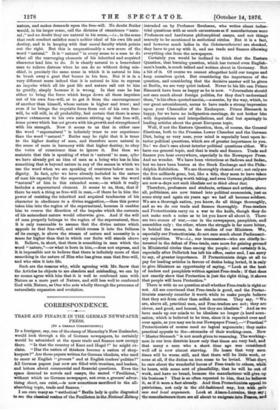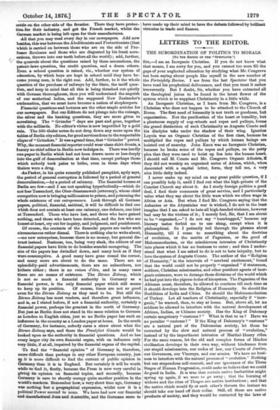CORRESPONDENCE.
TRADE AND FINANCE IN THE GERMAN NEWSPAPER PRESS.
[ay A GBIIMAN COELESSPONDBNT.) IF a foreigner, say, one of the stamp of Macaulay's New Zealander, would look through a file of German newspapers, he certainly would be astonished at the space trade and finance now occupy there. "Is that the country of Kant and Hegel ?" he might ex- claim. "Has the nation of thinkers become a nation of shop- keepers ?" Are those papers written for German idealists, who used to sneer at English " grocers " and at English traders' politics?" All German papers just now are filled with treatises, and leaders, and letters about commercial and financial questions. Even the space devoted to novels and essays, the sacred " Feuilleton," without which no German newspaper, not even a grocers' adver- tising sheet, can exist,—is now sometimes sacrificed to the all- absorbing topic, trade and finance. •
I am sure many an " msthetical " Berlin lady is quite disgusted to see the classical realms of the Feuilleton in the National Zeitung
intruded on by Professor Rouleaux, who writes about indus- trial questions with as much earnestness as if manufacturers were Professors and hardwares philosophical essays, and not things scarcely to be mentioned in a3sthetical circles. But it is a fact, and however much ladies in the Geheimrathviertel are shocked, they have to put up with it, and see trade and finance elbowing everything else from the newspapers.
Certainly you would be inclined to think that the Eastern Question, that burning question, which has turned even English- men's heads, is much talked and written about in Germany. Not a bit of it. Of course we cannot altogether hold our tongue and keep ourselves quiet. But considering the importance of the question, and considering that the decisive answer will be given- at Berlin, we are very quiet indeed. Never in his life can Prince Bismarck have been as happy as he is now. "Journalists should not care much about foreign politico, for they don't understand them," is his often-quoted maxim,—a maxim, by the way, which, to- our great astonishment, seems to have made a strong impression upon your Chancellor of the Exchequer. Prince Bismarck is happy, for we have no indignation-meetings, do not bother him with deputations and interpellations, and deal but sparingly in leading articles about the great European topic.
Well, if not the Eastern Question, then, of course, the General Elections, both to the Prussian Lower Chamber and the German Diet, being so very near, your mind is especially bent upon in- terior political questions, which are of greater importance to you. No! we don't care about interior political questions either. We- have one general topic, and that is trade and finance. Trade and finance you hear everywhere, especially in the Newspaper Press. And no wonder. We have been victorious at Sadowa and Sedan,
but we have been beaten at the Stock Exchange and the Phila- delphia Exhibition. We are thoroughly cleaned out ; not onlyare the five milliards gone, but, like a tide, they seem to have taken with them everything worth taking, and even German philosophers are now-a-days not such idealists not to think about that.
Therefore, professors and students, artisans and artists, above all, politicians, are now turned into political economists, just as-
some sixty and again six years ago we had all become soldiers.
We are a thorough nation, you know, do all things thoroughly, and so we do our trade and finance thoroughly. Free-traders and Protectionists carry on a war to the knife, though they do not make such a noise as to let you know all about it. There- are two scenes of war,—one in the newspapers, pamphlets, and- assemblies only ; the other, where the struggle is far more bitter, is behind the scenes, in the studies of our Ministers. We, especially our Protectionists, do not care much about Parliament- ary majorities. We—i.e., our ironmasters—who are chiefly in- terested in the defeat of Free-trade, care more for gaining ground. in Ministerial circles than among the people ; and certainly it is,.
especially after Delbriick has left his office, easier and, lain sorry to say, of greater importance. If Protectionists deign at all t& pay for leading articles in favour of duties being levied, it is only to give Ministers an opportunity of saying, "Look at the host of leaders and pamphlets written against Free-trade ; if that does- not exactly show that Protection is just the right thing, it shows- that people will have Protection."
There is with us no question at all whether Free-trade is right or not. All are convinced that Free-trade is good, and the Protec- tionists scarcely consider it worth while to make people believe that they act from other than selfish motives. They say, "We
are, above all, practical men, and Free-traders are not; they are clever, and good, and honest, but they are idealists." And as we have made up our minds to be idealists no longer (a hard accu- sation, which is believed to be true, since it is repeated over and over again, as you may see in our Newspaper Press),—" Practical"' Protectionists of course need no logical arguments ; they make practical appeals to the—stomachs of their working-men. Now "Master Stomach" is not much given to reasoning. The working- men in our iron districts know only that times are very bad, and that many a man who a short time ago was considered. well off is now almost starving. He hears that very soon, times will be worse still, and that there will be little work, or- none at all, if the duties on iron cease to be levied. What do- he care about the wonderful boons of Free-trade to othens) whei2 he hears, with some sort of plausibility, that he will be out of
work, and have no bread, because the manufacturer will give up his business ? That is so often repeated to him, that he banana it, as if it were a fact already. And then Protectionists, appeal- to.
patriotism, not only in the old-fashioned way, but 'with Pile new and local arguments. Look at Alsace-Lorraine, they ay ; the manufacturers there are all about to emigrate into nano., and
settle on the other side of the frontier. There they have protec- tion for their industry, and get the French market, whilst the German market is being left open for their manufactures.
All that you may read every day in our newspapers. Add now betides, this war between the Abolitionists and Protectionists (that which is carried on between those who are on the side of Pro- fessor Bouleaux and those who are disgusted by his frank accu- sations, thrown into our teeth before all the world) ; add, further, the quarrels about the questions raised by these accusations, the patent-laws question, the credit question, and a dozen others. Even a school question is raised, viz., whether our system of education, by which boys are kept in school until they have be- come young men, is the right one. Add, further, to it the whole question of the purchase of railways by the State, the tariff ques- tion, and keep in mind that all this is being thrashed out quietly with German thoroughness, then you will understand the anguish -of our testhetical ladies, and the supposed New Zealander's exclamation, that we must have become a nation of shopkeepers.
Financial questions and lectures are the other staple articles for our newspapers. But our Editors do not plunge into the coinage, the silver and the banking questions, they are more given to moralising. The " Griinder " days are past and gone, together with the milliards. No editor's virtue is now imperilled by a gold rain. The 500-thaler notes do not drop down any more upon the tables of Berlin city editors, for good services done to the respectable clique of" Griinders." It was a grand time, that " Grander " period. Why, the meanest financial reporter could wear clean shirt-fronts, a luxury no chief editor in Berlin now indulges in. There was hardly one paper in Berlin which had not been drawn more or less deeply into the gulf of demoralisation at that time, except perhaps those which nobody took pains to bribe, even in those days when thalers were a drug.
As Pasker, in his quite recently published pamphlet, aptly says, -the period of general corruption is followed by a period of general demoralisation,—by a period of calumny. The financial houses at Berlin are few—and I am not speaking hyperbolically—which do not fear Tessendorf, the Ober-Staataanwalt (attorney), whose chief -occupation now is bringing millionaires to prison, and poisoning the whole existence of our entrepreneurs. Look through all German papers, political, financial, satirical, it will be difficult to find one which does not contain at least one calumny, one defence, one hint at Tessendorf. Those who have lost, and those who have gained nothing, and those who have been detected, and the few who are honest at heart, cry out for inquiry, and judgment, and punishment.
Of course, the contents of the financial papers are under such circumstances rather dismal There is nothing else to write about, —no new enterprises, because there is no money, but general dis- trust instead. Business, too, being very slack, the editors of our financial papers have little to do besides scandal-mongering. The size of the papers has dwindled down, and many look as if they were consumptive. A good many have gone round the corner, -and many more are about to do the same. There are no splendidly-paid advertisements, there are no subscribers, nor bribers either ; there is no raison d'eire, and in many cases there are no means of existence. The Borsen Zeitung, which is not so much a financial authority in Germany as a financial power, is the only financial paper which still seems to keep up its position. Of course, times are not so good -even for the Barsen Zeitung as they used to be. But still the Borsen Zeitung has most readers, and therefore great influence, Sand is, as I stated before, if not a financial authority, certainly a financial power, perhaps the greatest in the north of Germany. But just as Berlin does not stand in the same relation to German as London to English cities, just so no Berlin paper has such an influence in the country as a London paper at home. In the south ,of Germany, for instance, nobody cares a straw about what the Borsen Zeitung says, and there the Frankfort Gazette would be looked upon as the authority in financial questions. And so has every larger city its own financial organ, with an influence only very little, if at all, impaired by the financial organs of the capital.
To find the "financial opinion" of Germany is, therefore, more difficult than perhaps in any other European country, just it is more difficult to find the current of public opinion in Germany than it is in England. But certainly it will be worth while to find it, firstly, because the Press is now very careful in giving its opinion on financial topics, and secondly, because Germany is sure to shortly occupy quite another position in the world's markets. Remember how, a very short time ago, Germany was nothing but a geographical expression, whilst now it is a political Power second to none. We have had now our financial and manufactural Jena and Austerlitz, and the Germans seem to I have made up their mind to have the defeats followed by brilliant victories in trade and finance.



































 Previous page
Previous page